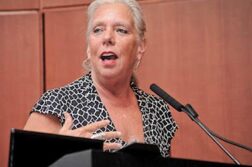THE GREAT WRITER Jill Johnston died suddenly on September 18 at the age of 81. In the 1960’s, Jill had achieved visibility and credibility among those in the know as a chronicler of the New York City avant-garde scene, particularly dance, through her regular column in The Village Voice. In the late 60’s Jill came out in her column, one of the first celebrity writers since Oscar Wilde and Radclyffe Hall to have the bittersweet honor of becoming a public homosexual.
Courage and creativity were in her DNA. It is instructive to compare Jill to her contemporary, Susan Sontag. I’ve got to believe that Sontag’s decision to hide her own lesbianism and avoid writing about it, even when she could have made a difference by coming out, helped her become the darling of the straight literati. Conversely, Jill’s reputation as a writer suffered when she became labeled, and labeled herself, a lesbian-feminist. Lesbians could never hope to represent the human condition, which is what Jill foolishly and wonderfully aspired to do as a writer.
Besides bringing to light the work of edgy dancers and musicians, Jill was one of the inventors of the “new journalism,” but did not get anything like the credit that Norman Mailer or Hunter Thompson did. Her writing was explosive, associative, funny, and astute, and I hope it will not be not forgotten. Jill as a person was theatrical, dynamic, and vulnerable. What follows is an edited excerpt from my journals, a version of which will appear in my memoir in progress, My Butch Career. Here I remember Jill just as Lesbian Nation was being published in 1972:
The brightest star in the lesbian feminist firmament was the former downtown dancer and columnist in the Village Voice, Jill Johnston. Louise [Fishman, my partner then] and I had devoured Marmalade Me, and Jill was just coming out with a new book, Lesbian Nation. Despite her bohemian charisma (she often wore a black bowler hat, leather pants with metal studs), Jill had been a married mother fifteen years before. “I sympathize-hate you,” my friend Shirley [Walton] observed. A year previously she had read a review of Marmalade Me that presented Jill as “living theatre, living poetry, living joy.” Shirley was resentful because of Jill’s “acting out life in toto, of presenting a living drama of change and feeling. She is what I dreamed of becoming.” I had met Jill at a party in the succeeding year, so that when I heard her speak about this new lesbian nation at the School of Visual Arts, she recognized me in the audience, much to my pleasure.
She is tall, awkward although a dancer, charming, gentle, oddly cruel, as I imagine extremists are. Hers is not a cruelty of intent, but a cruelty of detachment, of single-mindedness, of the artist mystic. Unlike Anaïs Nïn, she will not fail as an artist through being too human.
To a woman in the audience who babbled on nervously about human liberation and men’s problems, Jill replied, “It’s okay if you want to stop part way, but as for me, I’m going all the way with this thing.” Women’s total political and sexual liberation, cultural upheaval, the end of the patriarchy. This is what we imagined.
Louise and I were invited up to Jill’s rented house in the Berkshires:
Suddenly Phyllis [Birkby] and her new heartthrob, Bertha [Harris], showed up, and we climbed in the car and drove up to the house near New Paltz where Jill is working on her new book.
Jill is making a strenuous effort to get involved in the gay movement. She still wants to be a star, but not so isolated. The first time I met Jill, at a Thanksgiving party over two years ago, was, she tells me, the first time she met lesbians from the gay community.
When I think of Jill I think of her height (taller than my 5’8”) and her breasts. I felt how tall she was when she hugged me, and her breasts were large, white, and beautiful when I came down to breakfast this morning to find her lying in a sleeping bag naked with Jane [O’Wyatt], her “neomonogamous” lover. Why would these memories stick to me? Especially as the aftertaste of what was a high-powered, intellectual “heavy” weekend? Jill’s body mattered to me, how she looked and how her skin felt to my touch. When you looked up at her you saw an artist who was a lesbian, a woman who had had the nerve to say to a pugnacious Normal Mailer and a large audience of literary New Yorkers at Town Hall that “all women are lesbians.”
We arrived at Jill’s at dinnertime, and by the end of the evening I felt left out, insignificant, and put down. I stuck up for straight women (who me?) when Jill and others were putting them down and saying that lesbian and feminist defined each other. I said that the criterion shouldn’t be who you were sleeping with but who you were committed to, and that if we tried to define feminist by lesbian, the straight women would cop out with sighs of disappointment (and relief) and we would be left isolated and vulnerable. …
Besides Phyllis, who was drunk and in love with Bertha, Jill, Jane, Louise and me, two other women were there for the night. One was the “secretary” for the “Notes” project; Jill kept saying, “write down Jane Fonda, no, that’s pointless, scratch her … write down Dionysius, write down lesbian mothers,” etc.
After brainstorming all evening about the “Notes” project, we went off to our various mattresses. Make note that this summit meeting of revolutionary lesbian heavies was composed of four couples.
I was heartbroken that Jill and Bertha, who are both published, failed to notice me as a worthwhile writer, and disappointed that what I had fantasized as a crucible event in my ongoing chronicle of the New York lesbian feminist community was actually a somewhat uncomfortable gathering of people who didn’t know each other, sort of like an academic convention.
Two weeks later I got a lesson in star fucking. After a meeting in the city to work on Amazon Expedition, Jill and the group of us went to a lesbian party. As we walked in, I wrote, “Every single eye turned to Jill.” I felt protective toward her; the young dykes at the party were “devouring her, feeding themselves.” I remarked on the unconscious cruelty of the giggling remarks made behind their hands. … Questions of leadership and “stardom” were painful in second wave feminism. We young women were mostly from comfortable families, yet brothers had been favored and boys had sucked the air out of every room. In opposition to patriarchy and in line with “all men are created equal,” we were committed to the proposition that all “sisters” were equally important, that decisions must be made collectively and that all must be included. Yet the media wanted spokeswomen and every eye turned toward Jill when she walked into a room.
Esther Newton is term professor of women’s studies and American culture at the University of Michigan.




